
The Armed Forces of Honduras, consists of the Honduran Army, Honduran Navy and Honduran Air Force.

General Carlos Humberto Romero Mena was a Salvadoran army general politician who served as President of El Salvador from July 1, 1977, until his overthrow in a coup d'état on October 15, 1979.

The Christian Democratic Party of Honduras, known by the abbreviation DC, is a political party in Honduras. At the legislative elections, held on 25 November 2001, DC won 3.7% of the popular vote and 3 out of 128 seats in the National Congress. Its candidate at the presidential elections, Marco Orlando Iriarte, won 1.0% of the vote.
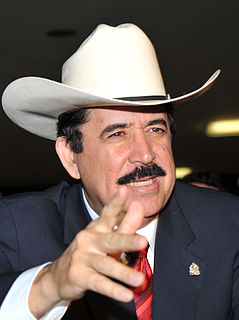
José Manuel Zelaya Rosales is a Honduran politician who was President of Honduras from 27 January 2006 until 28 June 2009. He is the eldest son of a wealthy businessman, and inherited his father's nickname "Mel". Before entering politics he was involved in his family's logging and timber businesses.

Iris Xiomara Castro or simply Xiomara Castro is a Honduran politician. She was a candidate for the 2013 presidential election representing the left-wing Libre Party. The wife of deposed former President Manuel Zelaya, Castro was a leader of the movement resisting the 2009 Honduran coup d'état that ousted her husband from power prematurely.
Atlético Gualala is a Honduran football club based in Gualala, Honduras.
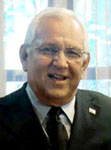
Roberto Micheletti Baín is a Honduran politician who served as the interim de facto president of Honduras from June 28, 2009 to January 27, 2010 as a result of the 2009 Honduran coup d'état. The Honduran military ousted the President, and the National Congress read a letter of resignation, which was refuted two minutes later by Zelaya in conversation with CNN en Español; days later, the coup-plotters claimed that the Supreme Court had ordered to forcefully detain President Manuel Zelaya because "he was violating the Honduran constitution"; Zelaya was exiled rather than arrested. Micheletti, constitutionally next in line for the presidency, was sworn in as president by the National Congress a few hours after Zelaya was sent into exile by the Honduran military. He was not acknowledged as de jure president by any government or international organization. The 2009 General Election took place as planned in November and elected Porfirio Lobo Sosa to succeed Micheletti.
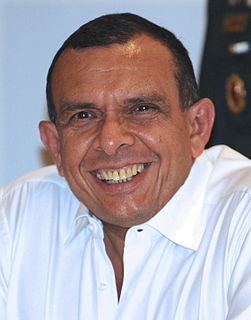
General elections were held in Honduras on 29 November 2009, including presidential, parliamentary and local elections. Voters went to the polls to elect:
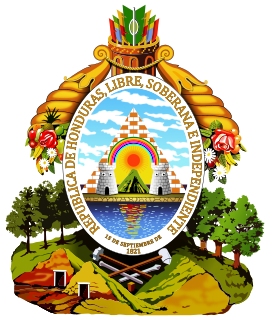
The 2009 Honduran constitutional crisis was a political dispute over plans to either rewrite the Constitution of Honduras or write a new one.
The 2009 Honduran constitutional crisis was a political confrontation concerning the events that led to, included, and followed the 2009 Honduran coup d'état and the political breakdown associated with it. The coup was repudiated around the globe, but Roberto Micheletti, head of the government installed after the coup, has claimed that the Honduran Supreme Court ordered the detention of Manuel Zelaya, deposed President of Honduras, and that the following succession was constitutionally valid.

The 2009 Honduran coup d'état, part of the 2009 Honduran constitutional crisis, occurred when the Honduran Army on 28 June 2009 followed orders from the Honduran Supreme Court to oust President Manuel Zelaya and send him into exile. Zelaya had attempted to schedule a non-binding poll on holding a referendum on convening a constituent assembly to rewrite the constitution. Zelaya refused to comply with court orders to cease, and the Honduran Supreme Court issued a secret warrant for his arrest dated 26 June. Two days later, Honduran soldiers stormed the president's house in the middle of the night and detained him, forestalling the poll. Instead of bringing him to trial, the army put him on a military aeroplane and flew him to Costa Rica. Later that day, after the reading of a resignation letter of disputed authenticity, the Honduran Congress voted to remove Zelaya from office, and appointed Speaker of Congress Roberto Micheletti, his constitutional successor, to replace him. It was the first coup to occur in the country since 1978.
Sindicato de Trabajadores de la Industria de la Bebida y Similares is a trade union in Honduras founded in 1959. It is affiliated to FUTH, a trade union congress, and internationally to the IUF. STIBYS is working together with other left-wing organizations in the CNRP and has been active in the resistance against the 2009 Honduras coup d'état.

Serious issues involving human rights in Honduras through the end of the 2010s include unlawful and arbitrary killings by police and others, corruption and institutional weakness of the justice system, and harsh and at times life-threatening prison conditions.
The National Popular Resistance Front or National People's Resistance Front, frequently referred to as the National Resistance Front, is a wide coalition of Honduran grassroots organisations and political parties and movements that aims to restore elected President Manuel Zelaya and hold a constituent assembly to draw up a new constitution.
The cuarta urna or fourth ballot box referendum was a plan by Honduran president Manuel Zelaya to run a non-binding referendum to consult the public regarding the administration of a second, binding referendum to convoke a constitutional assembly. The referendum was planned to run concurrently with the November 2009 presidential, congressional, and mayoral elections. Some Hondurans opposed the plan, including many politicians from the two largest parties. When Zelaya pushed ahead with plans for this referendum on whether to include a fourth ballot box, the Supreme Court issued a warrant for his arrest and the army expelled him from the country in a June 28 coup d'etat, precipitating the 2009 Honduran constitutional crisis.

Unión Cívica Democrática is a network of forty Honduran activist organizations, which took an active part during the 2009 Honduran constitutional crisis, promoting several demonstrations against the former ousted president Manuel Zelaya.
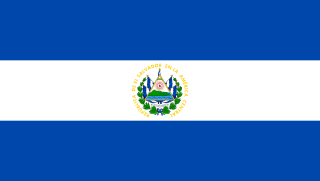
The Salvadoran military government, officially known as the Republic of El Salvador, and simply known as El Salvador, was the period of time in Salvadoran history where the Salvadoran Armed Forces governed the country for almost 48 years from 2 December 1931 until 15 October 1979. The authoritarian military dictatorship limited political rights throughout the country and maintained its governance through rigged and fixed elections.

Liberty and Refoundation is a leftist political party in Honduras. Libre was founded in 2011 by the National Popular Resistance Front (FNRP), a leftist coalition of organizations opposed to the 2009 coup.
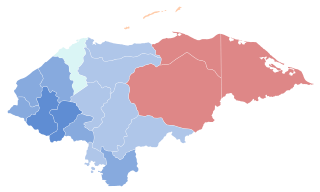
General elections were held in Honduras on November 24, 2013. Voters went to the polls to elect a new President, the 128 members of the National Congress, 298 Mayors and vice-mayors and their respective councilors and 20 representatives to the Central American Parliament.
Margarita Dabdoub Sikaffi is a Honduran politician. She is commonly known as Margie Dip. Dabdoub was the first female mayor of La Ceiba. She served as mayor of La Ceiba 1994–1998. Prior to entering electoral politics, Dabdoub worked as spokesperson for the Standard Fruit Company. She was named as governor of the Atlantida department by president Manuel Zelaya. Following the 2009 Honduran coup d'etat, that ousted Zelaya, Dabdoub declared that she had not been a 'cuartista' but opposed the coup.












